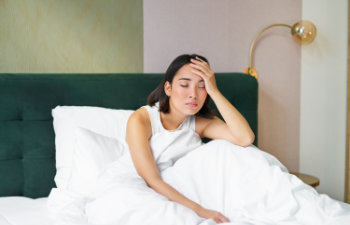
In today’s fast-paced world, getting a good night’s sleep is essential for maintaining overall health and well-being. Unfortunately, millions of people worldwide suffer from a condition called sleep apnea, often unknowingly. Sleep apnea disrupts sleep patterns, leading to a host of health issues. Beyond the physical consequences, this sleep disorder can also take a toll on mental health. As experts in sleep apnea treatment, Northern Virginia Sleep Solutions aims to shed light on the profound impact of untreated sleep apnea on mental well-being and the benefits of seeking proper treatment.
Mood Disorders
Untreated sleep apnea has been strongly associated with mood disorders such as depression and anxiety. The constant interruptions in sleep patterns caused by sleep apnea can disrupt the brain’s normal functioning, leading to imbalances in neurotransmitters and chemicals that regulate mood. As a result, individuals with untreated sleep apnea may experience persistent feelings of sadness, irritability, and anxiety, which can significantly impact their quality of life and overall mental health.
Cognitive Impairment
Sleep apnea doesn’t just affect the quantity of sleep; it also affects the quality. The frequent pauses in breathing during sleep lead to oxygen deprivation, which in turn affects the brain’s cognitive functions. People with untreated sleep apnea may experience difficulties with memory, concentration, and decision-making. The cognitive impairments caused by sleep apnea can contribute to decreased productivity, impaired work performance, and a decline in overall cognitive abilities, leading to increased frustration and decreased self-esteem.
Increased Risk of Psychiatric Disorders
Research has shown a strong correlation between untreated sleep apnea and an increased risk of developing psychiatric disorders. The chronic sleep deprivation and oxygen deprivation associated with sleep apnea can trigger or exacerbate conditions such as bipolar disorder, attention deficit hyperactivity disorder (ADHD), and even psychosis. By treating sleep apnea, individuals can potentially reduce the risk of developing or worsening these psychiatric disorders and improve their overall mental well-being.
Daytime Fatigue and Sleepiness
One of the hallmark symptoms of sleep apnea is excessive daytime sleepiness. The constant interruptions in sleep prevent individuals from reaching deep, restorative sleep stages, leaving them feeling tired and fatigued throughout the day. Persistent daytime sleepiness can have a profound impact on mental health, leading to decreased motivation, decreased energy levels, and a general sense of apathy. Moreover, it increases the risk of accidents, both at work and while driving, further adding to the mental and emotional strain.
Relationship and Social Implications
Untreated sleep apnea can significantly strain relationships and social interactions. The excessive snoring, gasping for breath, and restlessness during sleep can disrupt the sleep of bed partners, leading to resentment, frustration, and even sleep disturbances for both individuals. The resulting strain on personal relationships can lead to feelings of isolation, increased conflict, and a decreased overall quality of life.
Explore CPAP Alternatives for Sleep Apnea in Alexandria
The impact of untreated sleep apnea on mental health cannot be underestimated. From mood disorders and cognitive impairments to an increased risk of psychiatric disorders and relationship strains, the consequences of untreated sleep apnea can be far-reaching. Seeking proper diagnosis and treatment from professionals, such as Northern Virginia Sleep Solutions, can help individuals regain control of their sleep, improve their mental well-being, and enhance their overall quality of life. Our clinic proudly offers safe and comfortable alternatives to traditional CPAP machines. Remember, a good night’s sleep is not only vital for physical health but also for nurturing a healthy mind.
Posted on behalf of
1725 Duke St, Suite GR03
Alexandria, VA 22314
Phone: (571) 290-7977
nvsleepsolutions@gmail.com
Monday, Friday 8:00 AM – 3:00 PM
Tuesday - Thursday 7:00 AM – 5:00 PM